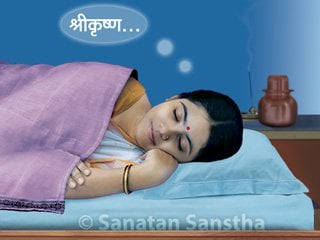Sound Sleep is very important part of life. The modern day hectic lifestyle, domestic tensions, office tensions etc. have made peaceful and sound sleep a rarity for most people. Absence of sound sleep adversely affects the following day’s work-schedule. Many of those who suffer from sleep disorders visit doctors in the hope of overcoming their problem. In this article you will get to know about meaning, importance, duration and reasons of getting sleep.

1. Origin and meaning of the word ‘nidra (Sleep)’
A. Origin
According to the Puranas (The eighteen sacred Holy texts compiled by Sage Vyas), nidra is the feminine form of Deity Brahma and it originated from the churning of the celestial ocean.
B. Meaning
‘मेध्यामनःसंयोगः’, meaning, the union of nadi (Energy channel) named ‘medhya’ and the mind is termed as nidra.
C. Satej nidra
Due to appropriate diet an individual progresses towards good sleep. This itself is called ‘Satej nidra’. During sleep when the subconscious mind has sattvik thoughts, at that time also the sadhana (Spiritual practice) of the individual goes on in the subconscious mind. Due to this sadhana, the individual’s mind becomes pure and it becomes easier for him to achieve dissolution of the mind. – A Scholar (Through the medium of Mrs. Anjali Gadgil)
2. Importance of sound sleep
Sleep is as essential as food for physical and mental wellbeing. Body and the organs wearout after a day’s work. To restore them to the original levels, rest is essential. The natural state of rest is sleep. Happiness-sorrow, obesity-leanness, knowledge-ignorance, health and strength are all dependent on sleep.
3. Duration of sound sleep
The duration of sleep varies with age, trigunas (The three basic components of Sattva, Raja, and Tama ) and prakruti (Basic nature or personality) of an individual.
A. According to age
Sleep of 10 to 12 hours per day for children, 8 hours for youth, 7 hours for adults and 4 to 6 hours for the aged is essential.
B. According to trigunas
Sleep of 4 to 6 hours per day for sattvik individuals, 8 hours for rajasik individuals and 10 to 12 hours for tamasik individuals is essential.
C. According to prakruti
1. An individual who has vata (Air) prakruti does not get peaceful sleep. He is restless during sleep and his sleep gets disturbed even at the drop of a pin.
2. An individual who has pitta (Bile) prakruti does not get peaceful sleep. He requires 8 hours of sleep everyday.
3. An individual who has kapha (Phlegm) prakruti gets peaceful sleep. He sleeps everyday for more than 8 hours’.
4. Reasons for getting sound sleep and the related processes
A. Various movements of the body exhaust organs and they need rest. Sleep fulfils this need.
B. Process of thinking during the whole day exhausts the mind and the brain; they too need rest. Sleep fulfils this need. An individual who gets peaceful sleep, is oblivious to all happenings around him and he does not dream too.
C. When all the sense organs merge into the mind, meaning, when functioning of all the organs ceases, the individual falls asleep. At that time, he cannot hear, see or smell.
D. When the mind merges with the prana, meaning, with the breath, its functioning ceases and the individual falls asleep.
E. An individual who has a balanced diet and who is sufficiently active needs regular and sufficient sleep.
A. Balance of positive and negative flows within the body and their relationship with sound sleep
When there is an increase in the proportion of flow of chetana-shakti (Sentient energy) within the body from the ‘Positive’, meaning, through the meridians (Note 1) of yang (Note 2), insomnia is likely to be on the rise. Whereas, if the proportion of life energy in ‘Negative’ meaning yin (Note 3) meridians increases, excessive sleep or even stupor results. If there is an adequate balance of the chetana-shakti between the positive and negative meridians, then even three to four hours sleep bestows enthusiasm or freshness.
Note 1 : The chetana-shakti within the body flows along specific path-ways throughout the body. These pathways are termed as meridians (‘Jing luo’) in Chinese language). In all, there are fourteen such main meridians.
Note 2 : The chetana-shakti that human beings receive from the sun is identified as ‘Positive’ (‘Yang’ in Chinese language) energy. This energy flows from the fingertips to the mouth and from there to the feet.
Note 3 : The chetana-shakti that human beings receive from the earth is identified as ‘Negative’ (‘Yin’ in Chinese language) energy. It flows from the feet to the trunk and from there through the inner side of the hand on to the palm.
Reference : Sanatan’s Holy text ‘How to sleep peacefully ?’
5. Benefits of waking up at dawn by sleeping early
Today lifestyle of people has been ruined because of the fast pace of life. People wake up late and also go to bed late. Probably waking up late is due to sleeping late. Research has brought forth several benefits of waking up at dawn.

1. Those who are early to bed and early to rise remain fresh all day.
2. Those who are habituated to waking up early in the morning by parents are calm and do not get irritable easily. They need not worry about developing illnesses such as depression and schizophrenia. They enjoy good mental health.
3. In a daily called Nature Communications a research paper in this regard has been published revealing a big truth about the day-to-day lifestyle of man. This research paper states that ‘sleeping late and waking up late’ may affect mental health adversely and may also cause other illnesses.
4. Research on this topic has been done under the guidance of ‘Exeter University’ in Britain and ‘Massachussets General Hospital’ in U.S.A.

 When and how much should one sleep ?
When and how much should one sleep ? What is the ideal position for sleeping ?
What is the ideal position for sleeping ? How to fall asleep fast?
How to fall asleep fast? Simple Ayurvedic remedies for sound sleep
Simple Ayurvedic remedies for sound sleep If you are unable to fall asleep then try removing the black energy enveloping (avran)...
If you are unable to fall asleep then try removing the black energy enveloping (avran)... In which posture should you sleep ?
In which posture should you sleep ?